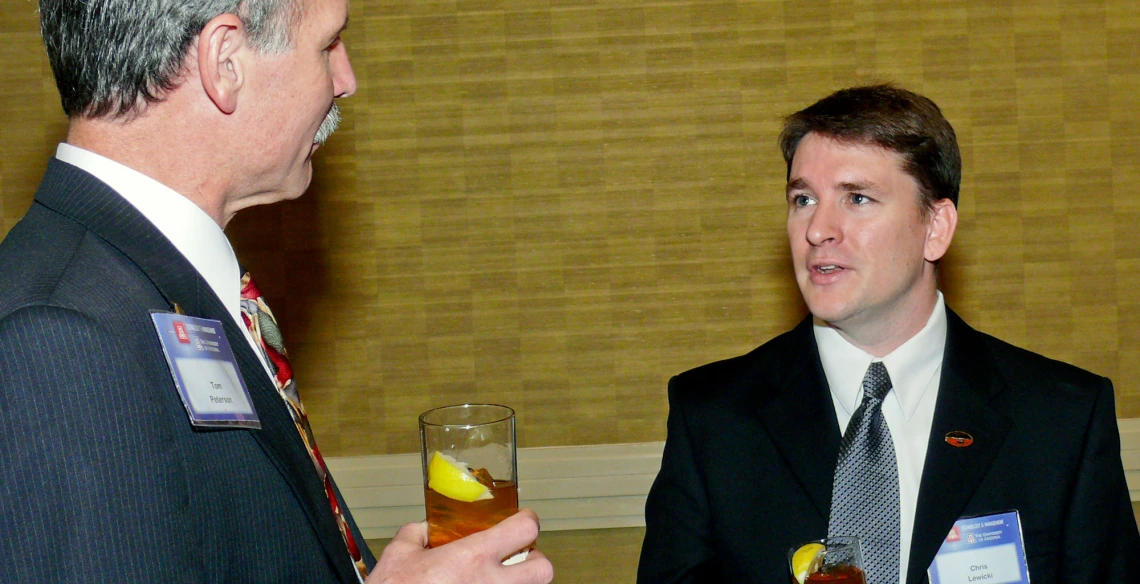Aerospace Engineering Alum Wins Technology Management Award for Shaping the Future
UA alumni honored at Technology and Management Awards include NASA mission manager and minerals economist.

Aerospace engineering alumnus Chris Lewicki, right, talks with College of Engineering Dean Tom Peterson at the 2008 TMAL Awards.
Chris Lewicki, manager of the Phoenix Mars Mission, won a Shaping the Future Award Oct. 10 at this year’s Technology and Management Awards Luncheon (TMAL). The awards were held at the Arizona Biltmore Resort & Spa in Phoenix, Ariz.
The TMAL awards were established 10 years ago to recognize the competitive advantage resulting from collaboration between engineering and business, and to create awareness in the business community of the collaborative courses and student-focused programs being pursued by the College of Engineering and the Eller College of Management.
New this year was the Shaping the Future Award, which recognizes the contributions of engineers and business executives whose work today will have a profound effect on the society of the future.
The awards were presented by UA President Robert N. Shelton; Paul Portney, dean of the UA Eller College of Management; and Thomas Peterson, dean of the UA College of Engineering.
The other Shaping the Future Award went to Roberto Guerrieri and Alicia Coleman, the founder and vice president, respectively, of Incentive Logic. Both received their master’s degrees in business administration from Eller. In 2007 and 2008, Incentive Logic was named on the Inc. 5000 list as one of the fastest growing companies in America.
Silver Award
The College of Engineering Lifetime Achievement Award went to Douglas Silver, who got his master’s degree in economic geology from UA in 1980. Silver he began his career as an exploration geologist with the Anaconda Copper Company. In 1986, he created a private consulting company, Balfour Holdings Inc., and spent more than 17 years advising clients on global mineral appraisals, acquisitions and mergers and strategic planning.
Silver suspended his consulting practice in 2003 to found International Royalty Corporation (IRC), a global mineral royalty company of which he is chairman and chief executive officer. IRC was the largest mining-related public offering on the Toronto Stock Exchange in 2005 and has since been listed on the American Stock Exchange. IRC’s revenue has grown from $400,000 in 2005 to $50 million in 2007.
Mars Star
The Phoenix Mars Mission, the first mission in NASA’s Scout program, successfully put the Phoenix Mars Lander on Martian soil on Sunday, May 25, 2008. Lewicki graduated from The University of Arizona’s College of Engineering in 1997 with a bachelor’s degree in aerospace engineering, and again in 2000 with a master’s degree in the same subject. In 2001, when he was a senior flight systems engineer at the California Institute of Technology’s Jet Propulsion Laboratory in Pasadena, Calif., Lewicki became flight director for NASA’s Mars Exploration Rovers Mission.
Almost 5 years after landing on Mars in January 2004, the two rovers -- Spirit and Opportunity -- are still going strong. At that time, Lewicki likened the experience of landing a rover to driving a sports car, but modestly asserted that flight engineers were “valets who bring it around to the front and give the keys to the science team.”
The Eller College Lifetime Achievement Award was made to Jay Geldmacher, under whose leadership Emerson Network Power’s Embedded Computing group has grown from $300 million to $2 billion in revenue, and is one of the world leaders of power conversion and computing products. Geldmacher attended the UA on a full basketball scholarship. He holds a bachelor’s degree in business administration from Eller College, and a master’s in business administration from the University of Chicago.
Stanford University Professor Donald Kennedy, editor-in-chief of Science magazine, delivered the keynote address at TMAL. In his address, Science: What’s New, What’s Promising, What’s Political, Kennedy discussed science from three angles: recent scientific discoveries that seem to have interesting possibilities but uncertain futures; health, energy and the environment; and new discoveries that have generated controversy.

